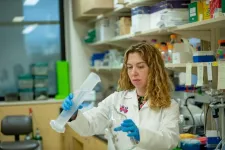(Press-News.org) Adult fragments of a coral species can better tolerate bleaching and recover faster when treated with tougher heat-evolved symbionts, new research from the Australian Institute of Marine Science (AIMS) and the University of Melbourne indicates.
The study also found that treatment with the heat-evolved symbionts did not compromise the coral’s ability to grow. This differs from previous studies on Great Barrier Reef corals which found that naturally heat tolerant symbionts could enhance heat resistance in adult corals, but at a cost to its growth.
Symbionts are the tiny cells of algae that live inside the coral tissue, providing corals with energy to grow. The survival of reef-building corals depends on this mutually beneficial relationship.
The symbionts used in this study had their heat tolerance bolstered in the lab by exposing multiple generations to elevated temperatures for 10 years. Adult coral fragments of a single species, Galaxea fascicularsis, that had been chemically bleached were then offered the heat-evolved symbionts. The scientists found the symbionts were able to maintain a symbiosis with adult corals for two years, promoting faster coral recovery from bleaching and enhancing their heat tolerance without trading off on growth.
Lead author on the study Dr Wing Yan Chan from AIMS and the University of Melbourne said the new findings suggest that heat-evolved algal symbionts are a potentially valuable resource for reef restoration applicable across coral species and life stages.
“These symbionts were still detected in the corals in moderate abundance two years after the corals were first inoculated, suggesting long-term stability of this symbiosis and potential long-term benefits to coral heat tolerance,” she said.
“Strategies to enhance coral heat tolerance can buy time for reefs, which are threatened by climate change-driven marine heatwaves causing bleaching and sometimes mortality. The long-term stability of the symbiosis offers hope they may be able to provide benefits to their coral hosts for many years.”
Professor Madeleine van Oppen from AIMS and the University of Melbourne, who is the senior author on the research, said earlier work in her group had shown the benefits of associating heat-evolved symbionts with coral larvae and juveniles.
“These new findings on adult coral close the circle and demonstrate the advantages are not lost in adulthood,” she said.
“This approach is one of several referred to as ‘assisted evolution’, which involves active interventions to accelerate the rate of naturally occurring evolutionary processes.”
Dr Chan said the next critical step of this research will be controlled field trials before it could be determined whether the intervention could work outside of the laboratory, with more than one coral type and at scale.
Dr Line Bay, a Research Program Director from AIMS who oversees AIMS’ coral focussed work within the Reef Restoration and Adaptation Program (RRAP), said the work was an important step in the research on enhancing heat tolerance in corals.
“This study is part of the extensive work AIMS, our partners and collaborators are doing to protect corals from climate change,” she said.
“To give coral reefs the best chance of survival, we need to reduce emissions, ensure coral reef systems are managed well, and develop interventions like heat-evolved symbionts to help boost climate tolerance and resilience for reefs.”
The research was a collaboration between AIMS, the University of Melbourne, Monash Institute of Pharmaceutical Sciences and the Melbourne Centre for Nanofabrication.
The research was funded by the Australian Research Council, the Paul G. Allen Family Foundation and RRAP, which is funded by a partnership between the Australian Government’s Reef Trust and the Great Barrier Reef Foundation.
The Chan et al paper ‘Heat evolved algal symbionts enhance bleaching tolerance of adult corals without trade off against growth’ was published in Global Change Biology today (Thursday, 2 November).
Images are available here.
END
Adult coral can handle more heat and keep growing thanks to heat-evolved symbionts
2023-11-02
ELSE PRESS RELEASES FROM THIS DATE:
Stronger, stretchier, self-healing plastic
2023-11-02
An innovative plastic, stronger and stretchier than the current standard type and which can be healed with heat, remembers its shape and partially biodegradable, has been developed by researchers at the University of Tokyo. They created it by adding the molecule polyrotaxane to an epoxy resin vitrimer, a type of plastic. Named VPR, the material can hold its form and has strong internal chemical bonds at low temperatures. However, at temperatures above 150 degrees Celsius, those bonds recombine and the material can be reformed into different shapes. Applying heat and a solvent breaks VPR down into its raw components. Submerging it in seawater ...
Brain health in over 50s deteriorated more rapidly during the pandemic
2023-11-02
rain health in over 50s deteriorated more rapidly during the pandemic, even if they didn’t have COVID-19, according to major new research linking the pandemic to sustained cognitive decline.
Researchers looked at results from computerised brain function tests from more than 3,000 participants of the online PROTECT study, who were aged between 50 and 90 and based in the UK. The remote study, led by teams at the University of Exeter and the Institute of Psychiatry, Psychology & Neuroscience (IoPPN) at King’s ...
Low Emission Zones improve air quality, health, and people’s well-being – new policy brief
2023-11-02
The introduction of London's Low Emission Zone (LEZ) in 2008 and subsequent Ultra-Low Emission Zone (ULEZ) from 2019 has significantly improved air quality, benefiting Londoners’ physical and mental health, according to new analysis from the Department of Economics at the University of Bath.
A new Institute for Policy Research (IPR) policy brief, presenting research from health economists at the University, indicates that the introduction of the LEZ helped to reduce particulate matter (PM10) in Greater London by 13% between 2008-13, compared to pre-LEZ levels (2003-07).
The ULEZ has had an even more substantial impact, ...
An MRI-equipped ambulance: A game-changer for stroke care?
2023-11-02
In the U.S., someone has a stroke every 40 seconds and dies from it every three minutes and 14 seconds, according to the Centers for Disease Control and Prevention. When it comes to stroke, experts echo the fact that time is brain. Faster treatment translates to better outcomes, and certain treatments, like the clot-busting drug tPA, have a strict time window for administration.
“The quicker that we can get the patient to treatment, the quicker we can have a good outcome,” said Dustin LeBlanc, M.D., director of Prehospital Medicine and associate chief medical officer for Emergency Management at the Medical University of South Carolina (MUSC). ...
Repurposed drug offers new potential for managing type 1 diabetes
2023-11-01
INDIANAPOLIS -- A recent study led by Indiana University School of Medicine in collaboration with the University of Chicago Medicine presents exciting future possibilities for the management of type 1 diabetes and the potential reduction of insulin dependency. The researchers’ findings, published in Cell Reports Medicine, suggest repurposing of the drug α-difluoromethylornithine (DFMO) may open doors to innovative therapies in the future.
Type 1 diabetes is a chronic condition wherein the body's immune system mistakenly ...
UCF hires Director of Development and Operations for Virtual Experience Research Accelerator (VERA)
2023-11-01
UCF Hires Director of Development and Operations for Virtual Experience Research Accelerator (VERA)
ORLANDO, Nov. 1, 2023 – Ali Haskins Lisle, Ph.D., has been named the Director of Development and Operations for the UCF-led Virtual Experience Research Accelerator (VERA).
VERA is a nearly $5 million U.S. National Science Foundation project to develop the first large-scale human-machine system for virtual reality human subjects research, with the goals of affording very large studies, very quickly, with populations that ...
Hebrew prayer book fills gap in Italian earthquake history
2023-11-01
The chance discovery of a note written in a 15th century Hebrew prayer book fills an important gap in the historical Italian earthquake record, offering a brief glimpse of a previously unknown earthquake affecting the Marche region in the central Apennines.
Paolo Galli, who found the note in the Apostolic Vatican Library while looking for contemporaneous accounts of another historic Italian earthquake, writes in Seismological Research Letters that the note “not only helps us partially fill a gap in the seismic history ...
UChicago chemists make breakthrough in drug discovery chemistry
2023-11-01
For years, if you asked the people working to create new pharmaceutical drugs what they wished for, at the top of their lists would be a way to easily replace a carbon atom with a nitrogen atom in a molecule.
But two studies from chemists at the University of Chicago, published in Science and Nature, offer two new methods to address this wish. The findings could make it easier to develop new drugs.
“This is the grand-challenge problem that I started my lab to try to solve,” said Mark Levin, ...
Docetaxel use associated with significant reduction in prostate cancer death in very poor prognostic group
2023-11-01
Men with high-grade prostate cancer and low prostate-specific antigen (PSA) levels have a poor prognosis. The question remains as to whether the chemotherapy drug docetaxel, which increases survival in metastatic prostate cancer, can improve the cure rate in these patients.
In a new study, investigators from Brigham and Women’s Hospital, a founding member of the Mass General Brigham healthcare system, a meta-analysis of five prospective randomized clinical trials (RCTs) found that adding docetaxel to standard-of-care (SOC) treatment was associated with a 70% reduction in death from prostate cancer-specific ...
Pet ownership may contribute to health care barriers for people with HIV
2023-11-01
People living with HIV may face hard choices when balancing their own health needs with caring for a pet, a study led by a University of Florida College of Public Health and Health Professions researcher finds.
For the study, which appears in the journal PLOS ONE, 36% of people with HIV who own pets reported delaying health care, not seeking it or said they expect to do so in the future. Financial and other resource concerns, including not having access to pet sitting or boarding services, are among the leading factors that may contribute to health care barriers among pet owners ...





